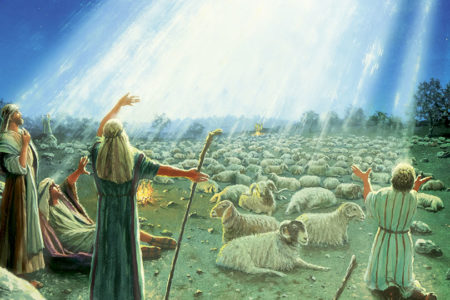The Grace of God Part Seven
The Grace Ministry of the Apostle Paul
In Acts 20:24 the apostle Paul referred to his purpose in life: “that I may finish my race with joy.” The Greek word translated finish means “to fulfill” or to carry out “a required course in the sense of a received commission.”1
Christ’s Commission to Paul
Paul’s required course was established through a commission delivered directly to him by Christ. Paul referred to it as “the ministry which I received from the Lord Jesus” (v. 24). The fact that Paul called Jesus “Lord” indicates he recognized Jesus had divine authority over him. That recognition occurred when the resurrected, glorified Christ confronted, spoke, and blinded Paul while Paul was on the road to Damascus to persecute believers in Jesus. The experience radically changed his life (9:1–8).
Jesus revealed His authoritative plans for Paul to Ananias, a believer whom He sent to minister to Paul. The Lord told Ananias, “Go, for he is a chosen vessel of Mine to bear My name before Gentiles, kings, and the children of Israel. For I will show him how many things he must suffer for My name’s sake” (vv. 15–16).
Paul recognized Christ’s commission required him to fulfill the ministry he received from Jesus. The Greek word translated as ministry in Acts 20:24 means “service.”2 According to language scholar Hermann W. Beyer, the word bears “a stronger approximation to the concept of a service of love.”3 It is “understood as full and perfect sacrifice, as the offering of life which is the very essence of service, of being for others, whether in life or in death.”4
The fact that Paul “received” this commission from Christ indicates the ministry was instigated by the Lord Himself, not “self-elected” by Paul.5 Paul further said it was through Christ that he “received grace and apostleship for obedience to the faith among all nations for His name” (Rom. 1:5) and that “the gospel which was preached by me is not according to man. For I neither received it from man, nor was I taught it, but it came through the revelation of Jesus Christ” (Gal. 1:11–12).
Christ commissioned him “to testify to the gospel of the grace of God” (Acts 20:24). The word testify refers to “an emphatic affirmation that a thing is or will be so.”6 The word gospel means “good news.”7
In 1 Corinthians 15:1–4, Paul recorded the content of the good news he affirmed as truth:
I declare to you the gospel which I preached to you, which also you received and in which you stand, by which also you are saved, if you hold fast that word which I preached to you––unless you believed in vain. For I delivered to you first of all that which I also received: that Christ died for our sins according to the Scriptures, and that He was buried, and that He rose again the third day according to the Scriptures.
Paul emphatically affirmed the truthfulness of this gospel message by reciting the multitudes of people who actually saw the Lord Jesus alive after He died and was buried:
He was seen by Cephas, then by the twelve. After that He was seen by over five hundred brethren at once, of whom the greater part remain to the present, but some have fallen asleep. After that He was seen by James, then by all the apostles. Then last of all He was seen by me also, as by one born out of due time. For I am the least of the apostles, who am not worthy to be called an apostle, because I persecuted the church of God. But by the grace of God I am what I am, and His grace toward me was not in vain; but I labored more abundantly than they all, yet not I, but the grace of God which was with me (vv. 5–10).
Paul was originally Saul of Tarsus, who hated Jesus Christ; the gospel message concerning Jesus’ death, burial, and resurrection; and people who believed in Jesus. Saul entered their houses, dragged them to prison, approved of their being killed, and made havoc of the church (Acts 7:58; 8:1, 3; 9:1, 13–14). He had originally believed that he was doing God’s work.
Nothing short of a supernatural encounter with the resurrected, glorified Christ could have transformed such a zealous, hardened, and unyielding opponent of Christ and all who believed in Him. Saul became an ardent, zealous proponent of both Christ and the gospel message concerning Christ’s death, burial, and resurrection. Saul’s transformation into the apostle Paul dramatically verified the truthfulness of the gospel message and convinced many people to believe it. If that message could radically change Saul, then it could change them.
Paul said Christ commissioned him to affirm the good news of “the grace of God.” The word translated grace “contains the idea of kindness which bestows upon one what he has not deserved.”8 It sometimes refers to “a gift (freely and graciously given), a favor bestowed.”9
Christ commissioned Paul to affirm that salvation is a gift from God. It cannot be earned. Jesus Christ, God’s Son, paid in full the penalty of our sins when He died on the cross and said, “It is finished!” (Jn. 19:30). A person appropriates that gift of salvation by placing his or her faith and trust in Jesus Christ as Savior.
Paul’s Fulfillment of the Commission
Toward the end of his life, Paul recounted how he faithfully fulfilled Christ’s commission. He told Jews and Gentiles the necessity of “repentance toward God and faith toward our Lord Jesus Christ” (Acts 20:21). The word repentance refers to “a change of mind,” “turning about,” “conversion,” “a turning away from dead works,” and the beginning of a new spiritual and moral life “that leads to God.”10
Bible scholar Johannes Behm said Paul “states the idea of conversion as a total refashioning of man’s nature and conduct by the grace of God.”11 He does so “in his own characteristic vocabulary of dying and becoming, i.e. the death of the old man and the rising again of the new man.”12 The “concept of a radical transformation effected by the revelation of God in Christ” became for Paul “the foundation of his whole theology. And this is precisely the thought of conversion as understood by Jesus.”13
That transformation certainly is what happened to Paul when Christ personally confronted him on Paul’s way to Damascus.
Paul’s Persecution
Jesus said He would show Paul “how many things he must suffer for My name’s sake” (9:16). The book of Acts records many instances of Paul’s suffering as he fulfilled Christ’s commission:
Damascus: Jewish zealots planned to kill him, but “disciples took him by night and let him down through the wall in a large basket” (vv. 23–25).
Jerusalem: Gentiles with whom he argued attempted to kill him, but believers took him to Caesarea and sent him to Tarsus (vv. 28–30).
Antioch in Pisidia: Jewish religious leaders and influential men and women expelled him (13:14–51).
Iconium: Gentiles, Jewish extremists, and rulers decided to abuse and stone him; so he fled (14:4–5).
Lystra: Jewish religious opponents came from Antioch and Iconium and stoned Paul, dragged him out of the city, and left him for dead. But he rose up and went to Derbe (vv. 6–20).
Thyatira: A multitude rose up against Paul, tore off his clothes, beat him, and threw him into prison (16:19–40).
Thessalonica: Jewish rabble rousers, and others rose up against him but did not physically abuse him (17:1–9).
Berea: Some Jews came and stirred up the people: Believers sent Paul away (17:10–14).
Athens: Paul was mocked but not harmed physically (vv. 16–33).
Corinth: Jewish scoffers resisted Paul and blasphemed but did not harm him. He taught there a year and a half (18:1, 6–11). Later they brought charges against him and brought him to the political judgment seat. But the Roman deputy refused to judge the matter (vv. 12–17).
Paul was determined to go to Jerusalem in spite of the Holy Spirit’s forewarnings of trouble there. Paul declared, “But none of these things move me; nor do I count my life dear to myself, so that I may finish my race with joy, and the ministry which I received from the Lord Jesus” (20:24).
ENDNOTES
- Gerhard Delling, “teleiow, Theological Dictionary of the New Testament (hereafter cited as TDNT), ed. Gerhard Friedrich, trans./ed. Geoffrey W. Bromiley, translated from Theologisches Worterbuch zum Neuen Testament (Grand Rapids, MI: Eerdmans, 1972), 7:81.
- William F. Arndt and F. Wilbur Gingrich, eds./trans., “diakonia,” A Greek English Lexicon of the New Testament and Other Early Christian Literature (1952: translation and adaptation of Walter Bauer’s Griechisch-Deutsches Worterbuch zu den Schriften des Neuen Testaments und der ubrigen urchristlichen Literatur, 4th ed.; Chicago: University of Chicago Press, 1957), 183.
- Hermann W. Beyer, “diakonia,” TDNT, ed. Gerhard Kittel, trans./ed. Geoffrey W. Bromiley (Grand Rapids, MI: Eerdmans, 1964), 2:81.
- Ibid., 86.
- G. Delling, “lambano,” TDNT, ed. Gerhard Kittel, ed./trans. Geoffrey W. Bromiley (Grand Rapids, MI: Eerdmans, 1967), 4:7.
- Hermann Strathmann, “marturomai,” TDNT, 4:512.
- Arndt and Gingrich, “euangelion,” 318.
- Joseph H. Thayer, “charis,” Thayer’s Greek-English Lexicon of the New Testament (Grand Rapids, MI: Zondervan, 1966), 666.
- Arndt and Gingrich, “charatos,” 887.
- Ibid., “metanoia,” 513–514.
- Johannes Behm, “metanoia,” TDNT, 4:1,005.
- Ibid.
- Ibid.






